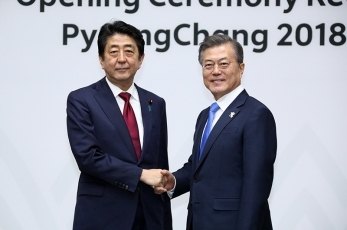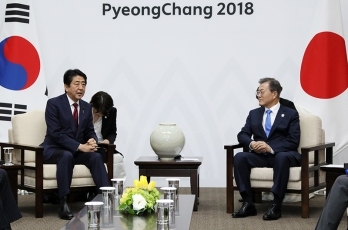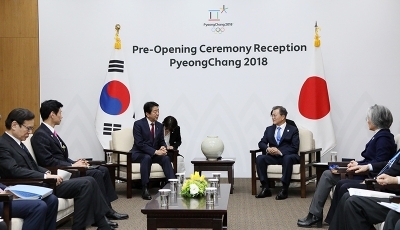Japan-Republic of Korea Relations
Japan-ROK Summit Meeting
 Photograph of the Prime Minister shaking hands
Photograph of the Prime Minister shaking hands with the President of the Republic of Korea
(Photo: Cabinet Public Relations Office)
 Photograph of the Japan-ROK Summit Meeting
Photograph of the Japan-ROK Summit Meeting (Photo: Cabinet Public Relations Office)
 Photograph of the Japan-ROK Summit Meeting
Photograph of the Japan-ROK Summit Meeting (Photo: Cabinet Public Relations Office)
On February 9, commencing at around 3:15 p.m. for approximately 60 minutes, Mr. Shinzo Abe, Prime Minister of Japan, who visited Pyeongchang to attend the PyeongChang Olympics Opening Ceremony, held a meeting with Mr. Moon Jae-in, President of the Republic of Korea (ROK). The overview of the meeting is as follows. (The participants of the meeting from the Japanese side were Mr. Yasutoshi Nishimura, Deputy Chief Cabinet Secretary, Mr. Shotaro Yachi, Secretary General of the National Security Secretariat (NSS), Mr. Eiichi Hasegawa, Special Advisor to the Prime Minister, and others).
1. Japan-ROK relations
Prime Minister Abe stated that the Japan-ROK agreement on the comfort women issue is a commitment between two countries, and that honoring commitments regardless of the change of administration is an internationally and universally recognized principle. He also conveyed that the government of Japan has been fully implementing the commitment and that Japan expects the ROK to fully implement its commitment under the agreement given that the ROK side has also confirmed that the comfort women issue is “finally and irreversibly” resolved through the Japan-ROK agreement, Prime Minister Abe also explained Japan’s position with regard to the “requisitioned workers” issue. Furthermore, Prime Minister Abe referred to regional exchanges between his hometown of Shimonoseki and Busan, and stated that he sincerely hopes to build a future-oriented relationship between Japan and the ROK together with President Moon. In order to achieve this, Prime Minister Abe, I called for the ROK to appropriately manage the Japan-ROK agreement and the “requisitioned workers” issue. Prime Minister Abe added that he would make efforts to make the 20th anniversary of the Japan-ROK Joint Declaration in fall this year an opportunity for building a future-oriented relationship.
2. North Korea
Prime Minister stated he appreciates that the Inter-Korean dialogue was pursued for the success of the PyeongChang Olympic Games. On the other hand, he pointed out that North Korea continues its nuclear and missile development and that other countries must not be blinded by North Korea’s “charm offensive.” He added that the period after the Olympic Games will be the key and that it is very important for North Korea to demonstrate sincere will and take concrete actions toward denuclearization. He stated that Japan, the ROK and the United States must not stray from their policy of maximum pressure through the trilateral coordination, facing directly the imminent threat posed by North Korea, and that a nuclear-armed North Korea can never be accepted. He claimed that implementing sanctions based on United Nations Security Council (UNSC) resolutions is the obligation of the entire international community and that addressing North Korea’s sanctions evasion, including so-called “ship-to-ship transfer” in which goods are exchanged at the sea, is a pressing issue. He added that he hopes to pursue coordinated responses among Japan, the ROK and the United States. He stated that the abductions issue is the most important issue concerning the sovereignty of Japan and the lives and the safety of Japanese citizens, and that he hopes to continue working closely for the early resolution of the issue. Furthermore, the two leaders shared the view that denuclearization is the ultimate goal, and that in order to achieve this, it is necessary for all UN Member States to fully comply with the UNSC resolutions and maximize pressure on North Korea.
3. Other
Prime Minister Abe explained that he hopes to hold a Japan-ROK-China Summit Meeting as soon as possible, and the two leaders shared the view that they will cooperate to hold the Summit Meeting promptly.

